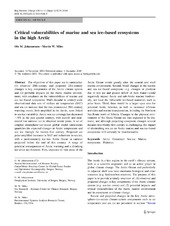Critical vulnerabilities of marine and sea ice–based ecosystems in the high Arctic
Peer reviewed, Journal article
Published version
Permanent lenke
https://hdl.handle.net/1956/5217Utgivelsesdato
2010-12-01Metadata
Vis full innførselSamlinger
- Geophysical Institute [1187]
Originalversjon
Regional Environmental Change 11(1): 239-248 https://doi.org/10.1007/s10113-010-0186-5Sammendrag
The objectives of this paper are to summarise: (1) observed 20th-century and projected 21st-century changes in key components of the Arctic climate system and (2) probable impacts on the Arctic marine environment, with emphasis on the vulnerabilities of marine and sea ice–based ecosystems. Multi-decadal to century-scale observational data sets of surface air temperature (SAT) and sea ice indicate that the two pronounced 20th-century warming events, both amplified in the Arctic, were linked to sea-ice variability. Arctic sea-ice coverage has decreased *8% in the past quarter century, with record- and nearrecord low summer ice in observed recent years. A set of coupled atmosphere–ice–ocean global model simulations quantifies the expected changes in Arctic temperature and sea ice through the twenty-first century. Projected are polar-amplified increases in SAT and reductions in sea ice, with a predominantly ice-free Arctic Ocean in summer projected before the end of this century. A range of potential consequences of Arctic warming and a shrinking ice cover are foreseen. First, exposure of vast areas of the Arctic Ocean would greatly alter the coastal and shelf marine environment. Second, broad changes in the marine and sea ice–based ecosystem—e.g. changes in plankton due to less ice and greater inflow of melt water—could negatively impact Arctic and sub-Arctic marine biodiversity, not least the vulnerable ice-based mammals such as polar bears. Third, there would be a larger open area for potential Arctic fisheries, as well as increased offshore activities and marine transportation, including the Northern Sea Route north of Siberia. Changes in the physical environment of the Arctic Ocean are thus expected to be dramatic, and although projecting ecosystem changes several decades into twenty-first century is challenging, the impact of diminishing sea ice on Arctic marine and sea ice–based ecosystems will certainly be transformative.

